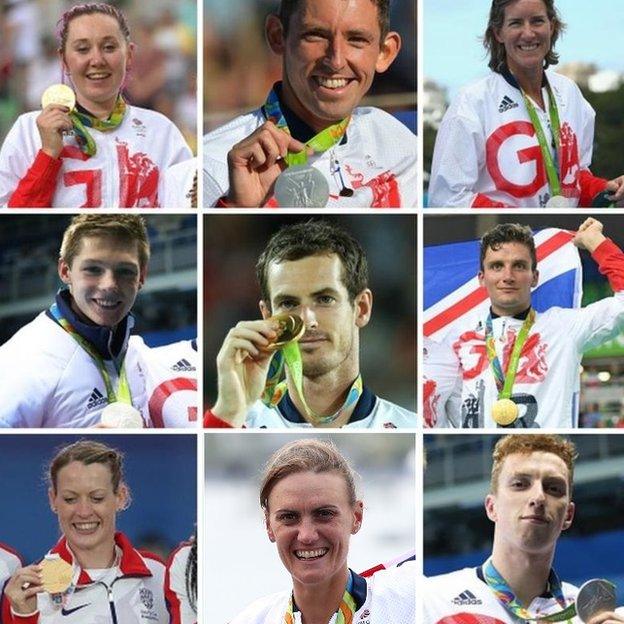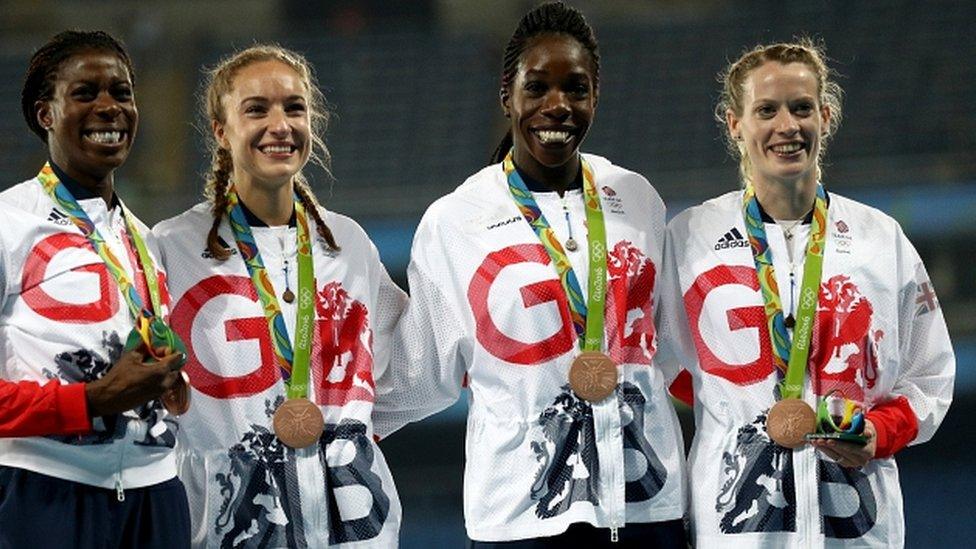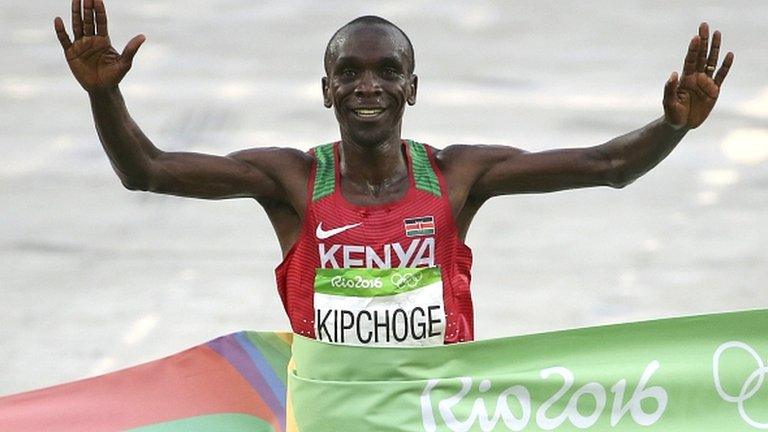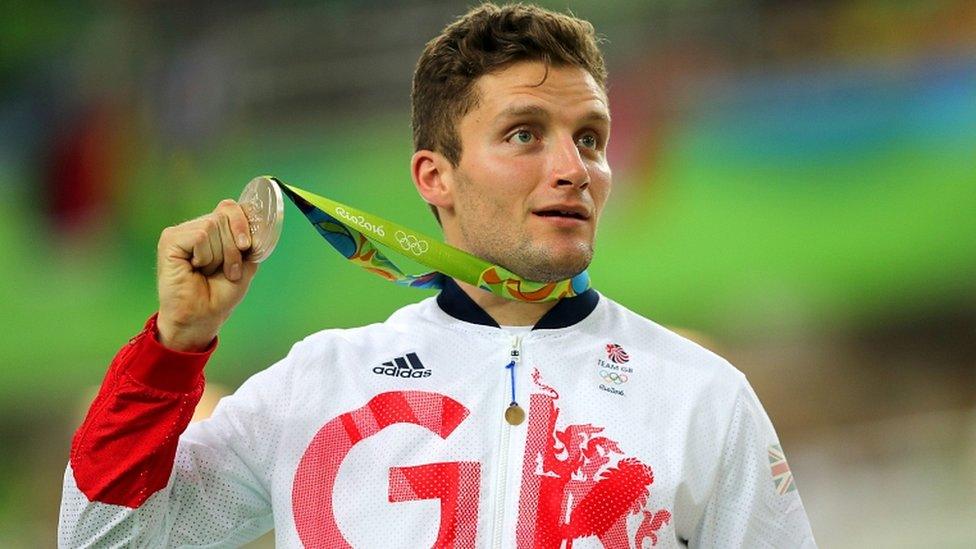Rio 2016: Memorable Olympics for Scots in Team GB
- Published

(top row, from left), Katie Archibald, David Florence, Katherine Grainger; (middle row, from left) Duncan Scott, Andy Murray, Callum Skinner; (bottom row, from left) Eilidh Doyle, Heather Stanning, Dan Wallace
Team GB has never had it so good at the Olympics, and the Scottish members of the squad head home happy to have made sporting history.
Gold medallists Callum Skinner, Katie Archibald, Heather Stanning and Andy Murray were perhaps the headline-grabbers. But across the 48 Scottish competitors - the largest in a British team at an overseas Olympics - there were many distinguished performers.
The British team return home with a total of 67 medals, their best result since the First World War, and bettered only by the London Games of 1908 when there were far fewer nations competing and sport was not as fiercely competitive.
In the history of the modern Games, stretching back to 1896, Scottish athletes have never enjoyed more medal success. Four years ago in London, 13 medals were won. That tally was matched here in Rio.
The Scots who fell short
In the midst of the heroics there were some disappointing moments for the Scots.
On the very first day in the pool, Inverurie's Hannah Miley was just an inch or two shy of her first Olympic medal but had to settle for 4th in the 400m individual medley.
That hated fourth spot - from where you can see and touch the Olympic podium but just aren't allowed on - was also reserved for fencer Richard Kruse, despite some excellent wins in the individual foil on the way to the bronze medal contest.
Alongside those two fourth places, there were some bigger disappointments. Commonwealth 200m breaststroke champion Ross Murdoch failed to make the final of the shorter 100m event.
The Rio Olympics were over in less than half a day for Linlithgow's Colin Fleming as he and English doubles partner Dom Inglot lost in the first round of the tennis on the very first morning. Jamie Murray's Games were over after round one after he and brother Andy lost in the doubles. Andy would have a chance to redeem himself in the singles. Jamie would not.
Medal rush begins in the pool
One medal. Four Scottish silver medallists. The 4x200m freestyle relay was entirely made up of Scots in the heats. World relay champion Robbie Renwick was the unlucky one asked to drop out to accommodate world individual champion James Guy - a decision fully vindicated by his world-class swim in the final. A sensational silver was secured with Duncan Scott, Dan Wallace and Stephen Milne building Guy a Scottish platform from which to claim the prize.
Judoka Sally Conway, part of the national set-up at Ratho for a decade, kept the Scottish momentum going for Team GB. There wasn't a broader, more infectious smile in the whole of Brazil than when she claimed bronze in the under-70kg category.
Katherine Grainger's smile was pretty big too. Written off by some in the build-up to these Games, she and partner Vicky Thornley produced their best performance together at just the right time to land a silver in the double sculls, and promote Grainger, 40, to the mantle of Britain's most decorated female Olympian.
Also on the water, canoeist David Florence. Disappointed with his individual efforts in the C1 final, made up for it with another silver in the canoe double with Richard Hounslow, matching their achievement in London four years ago.
Skinner delivers first gold won by a Scot
Callum Skinner has a lot to live up to. He learned track cycling in the same Meadowbank velodrome as Sir Chris Hoy, and was even helped and mentored by the great man. Now Skinner occupies the 'Hoy seat' as the anchor-man for the British sprint relay team, and quite happily did a 'Hoy' by bringing them home for gold in a thrilling final against New Zealand.
Mark Bennett and Mark Robertson both played in the inaugural rugby sevens competition, helping Team GB to a wonderful silver medal behind the irrepressible Fijians.
Rower Heather Stanning, with English partner Helen Glover, kept intact an incredible five-year unbeaten run to successfully defend the women's pair gold they won so memorably in London four years ago.
How appropriate then that medal number eight came from rowing's women's eight, ably assisted by Edinburgh's Polly Swann and Karen Bennett.
Who would get the record-breaking medal, making this the most successful overseas Olympics for Scottish athletes? And what colour would it be?
Fittingly, it was gold.
Unsurprisingly, it came in the velodrome, where Scots and Brits are next to unbeatable.
Katie Archibald helped Laura Trott and the rest of the women's pursuit team to the top of the Olympic podium, and thereby created a little piece of sporting history.
Nine medals for Scottish athletes at an overseas Games.
When Duncan Scott anchored the men's 4x100m medley relay team home to a silver medal that night, we were in completely uncharted territory. Double figures - 10 medals for Scottish athletes in Team GB at an Olympics on foreign soil.
Skinner's GB teammate Jason Kenny went head to head for gold in the individual sprint, with the Edinburgh man coming up just short. A gold and a silver in his first Olympics though - not too shabby.
Which left centre stage, and centre court, clear for Andy Murray. The Team GB flagbearer was desperately keen to lead by example.
He didn't disappoint.
A more dramatic, pulsating, mesmeric match you will struggle to see as Murray and Juan Martin del Potro slugged it out long into the Rio night. A four-hour, four-set epic.
Gold retained, history made. Andy Murray is the only player to have won two Olympic singles titles.
One more medal to add to record medal tally
Despite the best efforts of Luke Patience and Charlotte Dobson at the sailing, and various athletes in track and field, no more medals were added to the Scottish tally until the very last night of athletics.
Laura Muir and Lynsey Sharp reached Olympic finals, as did, even more commendably, Dunblane's Andy Butchart, a fabulous sixth in the 5,000m behind winner Mo Farah. For Liz McColgan's daughter Eilish, an Olympic 5,000m final too, an achievement given sharp focus by the fact that, as recently as Christmas, she could barely even walk after having seven screws and a plate inserted in her foot to help her injured ankle heal.
There was disappointment for Eilidh Doyle with an eighth place finish in the 400m hurdles; but she made up for it in the 4x400m relay, running the lead leg before Christine Ohuruogu anchored Britain to a famous bronze.
Doyle is the first Scottish athlete in 28 years to bring home an Olympic track and field medal.
Not a bad way to finish.
- Published21 August 2016

- Published21 August 2016

- Published21 August 2016
